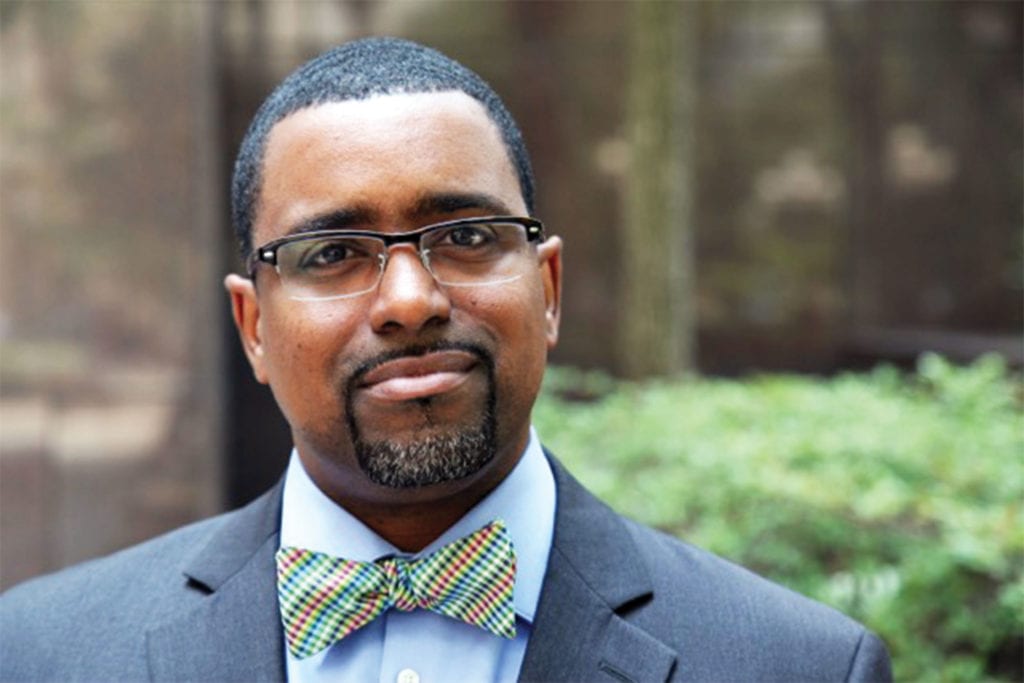ACLU attorney assesses DA campaigns
‘What a Difference’ public information campaign raised profile of Mass races

Suffolk County District Attorney hopeful Michael Maloney was the surprise guest at a public information session about the role of district attorney, organized by the American Civil Liberties Union (ACLU) of Massachusetts, last Monday at Suffolk University.
With little more than a week to go before the Nov. 6 election of Suffolk County’s new district attorney, Rahsaan Hall, director of the ACLU’s racial justice program, presented to about 40 students and voters at Suffolk University’s Mildred F. Sawyer Library on Tremont Street. As part of the ACLU’s “What a Difference a DA Makes” education campaign, Hall spoke about the importance of the district attorney, mass incarceration and racial disparities within the criminal justice system.
“A lot of folks will refer to it as the criminal justice system. I will refrain from that,” said Hall, who spent eight years as a prosecutor and has given this presentation in each of the five counties — Suffolk, Berkshire, Middlesex, Plymouth and Worcester — where candidates are battling for election to the district attorney’s office.
“I make it a point to say criminal legal system because when you think about the racial disparities that exist, the number of unsolved crimes that exist, the rates of wrongful conviction particularly in communities of color, it’s hard to call it a system of justice,” said Hall, “but it’s certainly a system of laws.”
Next week either Rachael Rollins, the Democratic nominee who won 40 percent of the vote in the primary, or Michael Maloney, an independent candidate and former defense lawyer, will become Suffolk County’s district attorney. The DA has the power to influence issues that have been central to both candidates’ campaigns, including bail reform, juvenile justice and the use of diversionary programs instead of jail time.
Maloney and his campaign manager dropped into the session on Monday to hear Hall’s presentation, but the candidate did not speak to voters.
The last time there were five open district attorney seats in Massachusetts was in 1982, and as a result, Hall said, historically there has been relatively little engagement with voters or public discussion about the position, leaving many people uninformed about the work of a district attorney.
According to a poll conducted by the ACLU at the end of last year, 38 percent of Massachusetts voters are not aware that the district attorney is elected, and more than half think that DAs have little to no impact on the criminal justice system.
The same poll from 2017 showed that 84 percent of voters think the criminal justice system should change to eliminate inherent racial bias, and 88 percent agreed that reforms are needed to stop people receiving different treatment in the system because of personal or political connections.
Criminal justice reform advocates won a significant victory this year when Gov. Charlie Baker signed the first major legislative overhaul of the system in 25 years. Some of the bill’s most impactful measures include raising the age of juvenile criminal responsibility from 7 to 12 years of age, banning solitary confinement for youth offenders and sanctioning expungement for minor crimes committed by those under the age of 21.
But this progress did not come easily, said Hall.
“When we were trying to get reform in the Legislature we were fighting an uphill battle,” he said, particularly in trying to convince some district attorneys and politicians that Massachusetts has an issue with mass incarceration.
Many, he said, clung to the idea that Massachusetts has one of the lowest incarceration rates in the country, which it does. But further research showed that if every U.S. state was a country, Massachusetts imprisons more residents than many countries around the world, including Canada, Japan and the United Kingdom.
Hall went on to discuss the racial disparities within the state’s prison population.
“The overwhelming number of people who are being funneled through the system are there because they are poor, they’re there because they have mental health issues, they’re there because they are black and brown and they come from communities that are over-policed and over-targeted, and that needs to change,” said Hall.
The ratio of black to white inmates is currently 6-to-1 nationwide, but in Massachusetts there are eight African-American inmates for every white person in prison.
“If you want to look at the incarceration rate versus the world, that’s problematic, and hopefully that will make you realize that it’s problematic,” said Hall. “If not, then certainly the racial disparities should be a motivator to make you think that the system as it exists and the way that we treat people is just wrong.”
Both Rollins and Maloney have been billed as progressive candidates who will implement bail reforms and increase the use of diversionary or rehabilitative programs. One key area they differ on is in the prosecution of minor crimes. Rollins has said explicitly that her office will not seek prosecution for offenses such as trespassing, drug possession or disorderly conduct, while Maloney has not made such a commitment.
“It’s really about changing the narrative about what district attorneys do and how they use their power,” said Hall. “We can keep ourselves safe by defining, determining and coming up with programs that are going to serve the community and put resources into the community, as opposed to locking everyone up and putting them in cages.”






